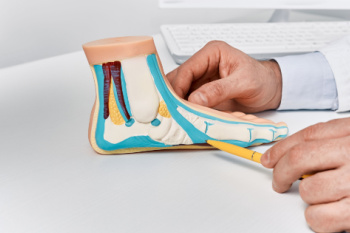
Flat feet, or pes planus, is a common condition where the arches of the feet are either low or completely absent, causing the soles to make full contact with the ground. The causes of flat feet can vary widely, including genetic predisposition, muscle imbalances, and injuries that affect the ligaments and tendons. In some cases, flat feet can develop during childhood as the arches form, while others may experience it as adults due to wear and tear or medical conditions. There are two primary types of flat feet, which are known as flexible and rigid. Flexible flat feet are characterized by arches that appear when sitting but flatten when standing, usually causing minimal discomfort. Rigid flat feet maintain a flat appearance regardless of position and can lead to pain and difficulty with movement. Flat feet can cause pain and discomfort. If you have this condition, iti is suggested that you consult a podiatrist who can offer you relief tips, and guide you on what type of shoes to wear.
Flatfoot is a condition many people suffer from. If you have flat feet, contact Daniel Mendoza, DPM from Nashville Podiatry. Our doctor will treat your foot and ankle needs.
What Are Flat Feet?
Flatfoot is a condition in which the arch of the foot is depressed and the sole of the foot is almost completely in contact with the ground. About 20-30% of the population generally has flat feet because their arches never formed during growth.
Conditions & Problems:
Having flat feet makes it difficult to run or walk because of the stress placed on the ankles.
Alignment – The general alignment of your legs can be disrupted, because the ankles move inward which can cause major discomfort.
Knees – If you have complications with your knees, flat feet can be a contributor to arthritis in that area.
Symptoms
- Pain around the heel or arch area
- Trouble standing on the tip toe
- Swelling around the inside of the ankle
- Flat look to one or both feet
- Having your shoes feel uneven when worn
Treatment
If you are experiencing pain and stress on the foot you may weaken the posterior tibial tendon, which runs around the inside of the ankle.
If you have any questions please feel free to contact our office located in Hendersonville, TN . We offer the newest diagnostic and treatment technologies for all your foot and ankle needs.
